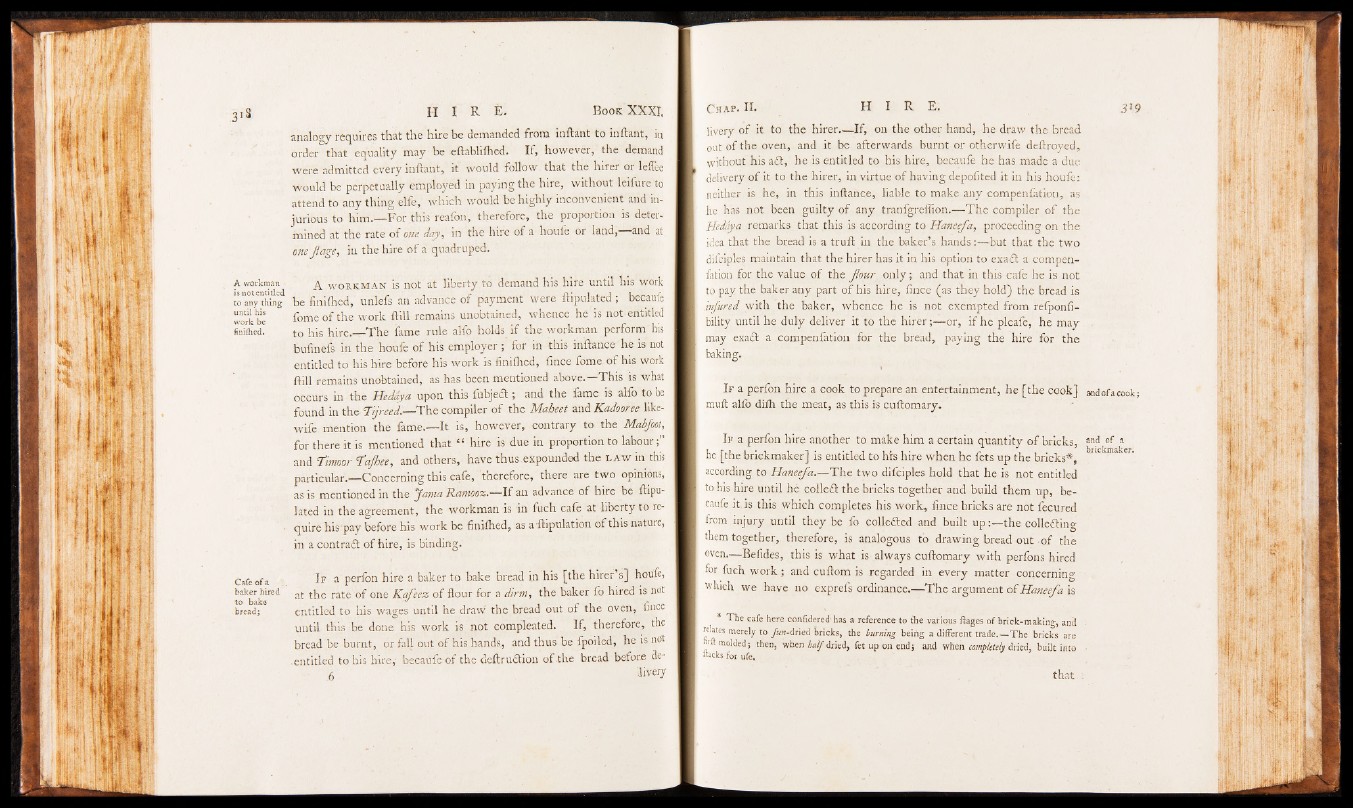
analo°y requires that the hire be demanded from inftant to inftant, m
order that equality may be eftablifhed. If, however, the demand
were admitted every inftant, it would follow that the hirer or leffee
would be perpetually employed in paying the hire, without leifure to
attend to any thing elfe, which would be highly inconvenient and injurious
to him.— For this realon, therefore, the pioportion is detei-
mined at the rate of one day, in the hire of a houfe or land, and-at
one fa g e , in the hire of a quadruped.
A workman - ^ w o r k m a n is not at liberty to demand his. hire until his work
io”any thiig be finilhed, unlefs an advance of payment were ftipulated ; becaufe
work be fome o f the work ftill remains unobtained, whence he is not entitled
faiihed. t0 his hire— The fame rule alfo holds if the workman perform his
bufinefs in the houfe of his employer ; for in this inftance he is not
entitled to his hire before his work is fimilled, fince fome. of his work
ftill remains unobtained, as has been mentioned above.—This is what
occurs in the He day a upon this fubject; and the fame is alfo to be
found in the Tijreed.— The compiler of the Maheet and Kadooree like-
wife mention the fame.— It is, however, contrary to the Mabfoot,
for there it is mentioned that “ hire is due in proportion to labour;”
and Tvmoor fajhee, and others, have thus,expounded the l a w in this
particular.— Concerning this cafe, therefore, there are two opinions,
as is mentioned in the Jama Ramooz.— I f an advance of hire be ftipu-
lated in the agreement, the workman is in fuch cafe at liberty to re-
• quire his pay before his work be finiflied, as aftipulation of this nature,
in a contradt of hire, is binding.
If a perfon hire a baker to bake bread in his [the hirer s] houfe,
at the rate of one Kafeez of flour for a dirm, the baker fo hired is not
entitled to his wages until he draw' the bread out of the oven, fince
until this be done his work is not compleated. If* therefore, the
bread be burnt, or fall out of his hands., and thus be fpoiled, he is not
entitled to his hire,' becaufe of the deftruction of the bread before de-
.6 livery
Cafe of a
baker hired
to bake
bread;
livery of it to the hirer.— If, on the other hand, he draw the bread
out of the oven, and it be afterwards burnt or otherwife deftroyed,
without his ait, he is entitled to his hire, becaufe be has made a due
delivery of it to the hirer, in virtue of having depofited it in his houfe:
neither is he, in this inftance, liable to make any compenfation, as
he has not been guilty of any tranfgreflion.— 'The compiler of the
Heddya remarks that this is according to Haneefa, proceeding on the
idea that the. bread is a truft in the baker’s hands:— but that the two
difciples maintain that the hirer has it in his option to exact a compen-
fation for the Value of the flour only; and that in this cafe he is.not
to pay the baker any part of his hire, fince (as .they hold) the bread is
injured with the baker, whence he is not exempted from refponfi-
bility until he duly deliver it to the hirer;— or, if he pleafe, he may
may exadt a compenfation for the bread, paying the hire for the
baking.
If a perfon hire a cook to prepare an entertainment, he [the cook]
muft alfo difti the meat, as this is cuftomary.
If a perfon hire another to make him a certain quantity of bricks,
be [the brick maker] is entitled to his hire when he fets up the bricks*,
according to Haneefa.— The two difciples hold that he is not entitled
to his hire until he colledt the bricks together and build them up, becaufe
it, is this which completes his work, fince bricks are not fecured
from injury until they be fo colledted and built up:—the colledting
them together, therefore, is analogous to drawing bread out of the
oven.— Befides, this is what is always cuftomary with perfbns hired
for fuch w o rk ; and cuftom is regarded in every matter concerning
which we have no exprefs ordinance.— The argument of Haneefa is
T h e cafe here confidered-has a reference to the various ftages o f brick-making, and
relates merely to fun -dried bricks, the burning being a different trade.— T h e bricks are
rft molded; then, when half dried, fet up on end; and when completely dried, built into
hacks for ufe.
andofacook;
and of a
brickmaker.
that